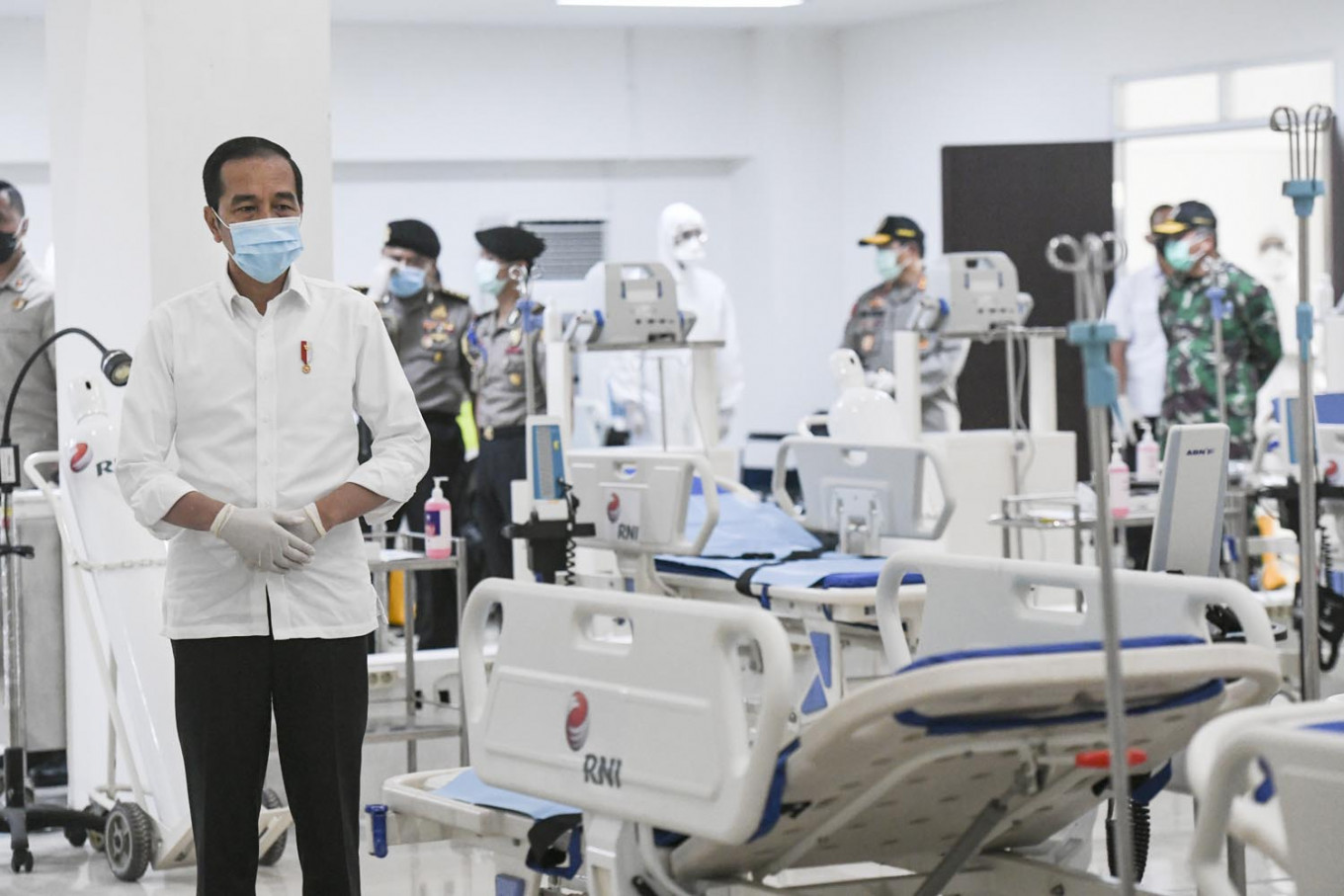Popular Reads
Top Results
Can't find what you're looking for?
View all search resultsPopular Reads
Top Results
Can't find what you're looking for?
View all search resultsCOVID-19: Jokowi draws criticism for statements on lockdown, ‘mudik’
Change text size
Gift Premium Articles
to Anyone
P
resident Joko “Jokowi” Widodo has conveyed his skepticism over strict emergency protocols amid the current COVID-19 pandemic, suggesting that there is no conclusive evidence that indicates lockdowns are effective.
His statements, however, immediately drew criticism from the general public on social media, with many saying that lockdowns had helped some countries to flatten the curve.
Speaking to television journalist Najwa Shihab at the State Palace in Central Jakarta on Tuesday, Jokowi said that the cost of imposing a lockdown would be astronomical.
“Bukan masalah budget. Kita juga belajar dari negara lain apa lockdown itu berhasil menyelesaikan masalah, kan tidak. Coba tunjukkan negara mana yang berhasil melakukan lockdown dan menghentikan masalah ini, nggak ada menurut saya,” kata @Jokowi. #MataNajwaJokowiDiujiPandemi pic.twitter.com/nHvBSubv6U
— TRANS7 (@TRANS7) April 22, 2020
“For Jakarta alone, we calculated that we would need Rp 550 billion [US$35.3 million] per day,” Jokowi said, referring to the cost of maintaining citizens’ livelihoods if the government imposed a lockdown.
“[The cost] would triple in the case of Greater Jakarta.”
Read also: 'Lockdown would have overwhelmed govt', says COVID-19 task force head
Jokowi said there was insufficient evidence of a direct connection between a lockdown and a lower rate of infection in other countries.
“It’s not a budget issue. We also learned from other countries about whether a lockdown has resolved [the pandemic] – it has not,” Jokowi said. “Show me countries that have imposed a lockdown and managed to resolve this problem. I don’t think there’s [any such country].”
The President went on to say there had yet to be any “fixed formula” that could be replicated to mitigate the current health crisis.
The Jokowi administration previously caught flak for its apparent reluctance to enforce movement restrictions to curb the rapid spread of COVID-19.
Jokowi decided to ban the Idul Fitri mudik on Tuesday, two weeks after insisting that mudik would be allowed despite the current health emergency.
However, a recent Transportation Ministry survey showed that 7 percent of Indonesian citizens had already left for their hometowns ahead of the Idul Fitri holiday.
In the same interview with Najwa, Jokowi said that those who had returned to their home regions ahead of the Islamic holiday did not count as Idul Fitri holidaymakers.
“It was not mudik [exodus], it was simply pulang kampung [returning to one’s hometown], [which applies to] those who work in Greater Jakarta but no longer earn an income,” Jokowi said, insisting that the two were entirely different things.
Read also: 'I need to protect my family': Jakartans nix homecoming trips following COVID-19 'mudik' ban
Jokowi’s statement has since been met with criticism from experts and the public alike, with some claiming that the President’s remarks contradicted data on lockdowns and the definition of mudik itself.
KawalCOVID-19 community group initiator Ainun Najib responded to Jokowi’s statement on lockdowns, mentioning a number of countries that managed to flatten the curve after imposing lockdowns.
Pak @jokowi bilang ga ada negara yg berhasil lockdown, sayang @NajwaShihab ga siap jawab.
Berikut ini beberapa negara yang berhasil melandaikan kurva dengan lockdown:
China 🇨🇳
Vietnam 🇻🇳
New Zealand 🇳🇿
Brunei 🇧🇳
Mongolia 🇲🇳
Lebanon 🇱🇧
Yordania 🇯🇴 https://t.co/eODkl2Jecj
— Ainun Najib #SemuaPakaiMasker atau #DiamDiRumahAja (@ainunnajib) April 23, 2020
“Here are several countries that have flattened the curve of infection through a lockdown: China, Vietnam, New Zealand, Brunei [Darussalam], Mongolia, Lebanon and Jordan,” @ainunnajib tweeted on Thursday.
Several Twitter users also poked fun at Jokowi’s insistence that returning to one’s hometown was different from mudik, with some posting screenshots of the word’s official definition according to the Great Dictionary of the Indonesian Language of the Language Center (KBBI).
Ingat ya saudara2, kata2 Pak @jokowi selaku Presiden pastinya lebih bisa dipercaya.
Lagipula KBBI bilangnya 'pulang ke kampung' bukan pulang kampung.
Ada 'ke' diantaranya.
Jelas? pic.twitter.com/Z8EsI1tje4
— Nurlely Siregar (@NurlelySiregar) April 22, 2020
“Remember folks, the statement from President Pak Jokowi is obviously more reliable. According to the KBBI, mudik means ‘pulang ke kampung’ [returning to one’s hometown] and not ‘pulang kampung’. There’s a ‘ke’ [to] separating them. Is that clear?” @NurlelySiregar tweeted, alongside a screenshot of the KBBI entry.
Another Twitter user, @jerrysoes, posted a screenshot of the Wikipedia page about mudik, saying that the platform must revise its definition of the word in light of Jokowi’s statement.
Wikipedia harus revisi! Love pak jokowi pic.twitter.com/Z7D8bg3drX
— Difficult Water (@jerrysoes) April 22, 2020
“Wikipedia must revise! Love Pak Jokowi,” the user tweeted.
As of Thursday, Indonesia had recorded at least 7,775 cases of COVID-19 and 647 deaths. (rfa)










